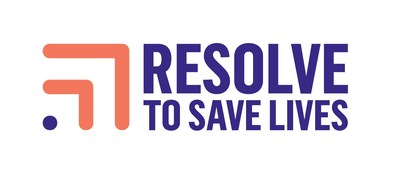Experience demonstrates that rapid improvement of country-level preparedness is possible and is essential for stronger global health security
NEW YORK, May 24, 2022 /PRNewswire/ -- In partnership with public health institutions in eight African countries, Resolve to Save Lives released a report on five proven approaches for national governments to significantly improve epidemic detection and containment in their communities. The model is based on joint efforts among African nations to mitigate the spread of COVID-19 and other infectious diseases over the past five years. The resulting recommendations, informed by on-the-ground experience, serve as a pathway forward for countries and global institutions to more quickly find and stop health threats by improving health protection at the country level.

"Country-led efforts are critical to create practical and sustainable preparedness infrastructure," said Dr. Jane Aceng, Minister of Health of Uganda. "Strengthening countries' ability to find, stop, and prevent epidemics better protects countries and is essential to better protect the world."
Several countries have worked together with Resolve to Save Lives to test these approaches, including The Gambia, Ghana, Ethiopia, Nigeria, Rwanda, South Africa, Senegal and Uganda. In Uganda, preparedness capabilities increased by 35% between 2018 and 2020 as measured by the State Party Self-Assessment Annual Reporting tool.
In the past year, more than 60 disease outbreaks have been detected - often at the level of a local community. This underscores the need for more agile, proven country-level capacity to find, stop and prevent outbreaks in ways that take into account a country's unique context.
"Since the emergence of COVID-19, multiple international bodies have looked at ways to improve the global health systems. Far less attention has been paid to the country-level systems required for a more protected world," said Amanda McClelland, Senior Vice President of Prevent Epidemics at Resolve to Save Lives. "It is imperative epidemic and pandemic mitigation plans are informed by real-world experiences. Countries must not be forgotten - they are the front lines of effective preparedness and response."
Based on years of experience before and during the Covid pandemic, the report recommends five strategies to help countries better prepare for future epidemics:
- Activate political leadership and a multisectoral coordination mechanism.
Weak political will and poor program management can create roadblocks to implementing preparedness efforts. Preparedness systems alone are not sufficient to address health threats without effective, committed and consistent leadership-from the day-to-day management of multisectoral activities up to the highest level of a country's government. - Establish dedicated teams to accelerate epidemic preparedness.
Preparedness requires dedicated human resources; however, many countries rely on teams who are also responsible for emergency response. Resolve to Save Lives has partnered with countries to design, fund and implement dedicated preparedness acceleration teams embedded within governments. These projects have have shown that countries with such teams improved preparedness capabilities faster than other countries. A dedicated, full-time multidisciplinary preparedness team can accelerate the development, prioritization and implementation of realistic plans to better prepare a country for epidemics. - Adopt an accessible tracking system to steer preparedness plan implementation and strengthen accountability.
Preparedness plans are complex, operating across many different technical areas. Without clear prioritization, plans tend to be unwieldy and difficult to execute. Creating and tracking progress of implementation provides a shared overview across sectors, facilitates collaboration, and increases accountability by increasing visibility and transparency. Using this data to drive decision-making can help countries continuously improve preparedness. - Adopt timeliness metrics to drive performance improvement.
All elements of the health security system-from laboratories and surveillance to health coverage and leadership-must work together to detect and respond to disease threats. Timeliness is a start-to-end assessment of the speed with which a system detects and responds to threats. As a target, Resolve to Save Lives proposes 7-1-7: 7 days to detect, 1 day to report to public health authorities and initiate response and 7 days to mount an effective initial response to every outbreak. Timeliness metrics provide real-time data that reflects the performance of the system and highlights opportunities for quality improvement. - Streamline partnerships and promote alignment to improve support.
The global health landscape is fragmented, undermining effectiveness. Health leaders in Africa have repeatedly urged development partners to better coordinate efforts when supporting countries to strengthen health security. Yet donors and partners continue to lack coordination and often duplicate efforts. Flexible funding that can be allocated across priority projects, and is tracked and reported against donor commitments, will reduce duplication and allow for decision making based on country needs.
These five steps can help countries make substantial, steady and sustained progress protecting their people, their neighboring countries, and the world. The global community can help countries through investment and aligning their efforts with national plans. Country-led efforts to design their health security agenda putting communities front-and-center as the frontline of outbreak detection are crucial to preventing the next big disease threat.
Read the Strengthening Epidemic Preparedness at the Country Level Issue Brief here.
For more information or to learn more about Resolve to Saves Lives, please visit: www.resolvetosavelives.org
About Resolve to Save Lives
Resolve to Save Lives is a not-for-profit organization partnering with countries, communities and organizations to prevent 100 million deaths from cardiovascular disease and make the world safer from epidemics. To find out more, visit: https://www.resolvetosavelives.org or Twitter @ResolveTSL.
Media Contact:
Steven Chlapecka, Senior Media Strategist, Resolve to Save Lives, schlapecka@resolvetosavelives.org, +1.917.623.0246
General press inquiries, press@resolvetosavelives.org
Logo - https://mma.prnewswire.com/media/1824062/Resolve_to_Save_Lives_Logo.jpg

